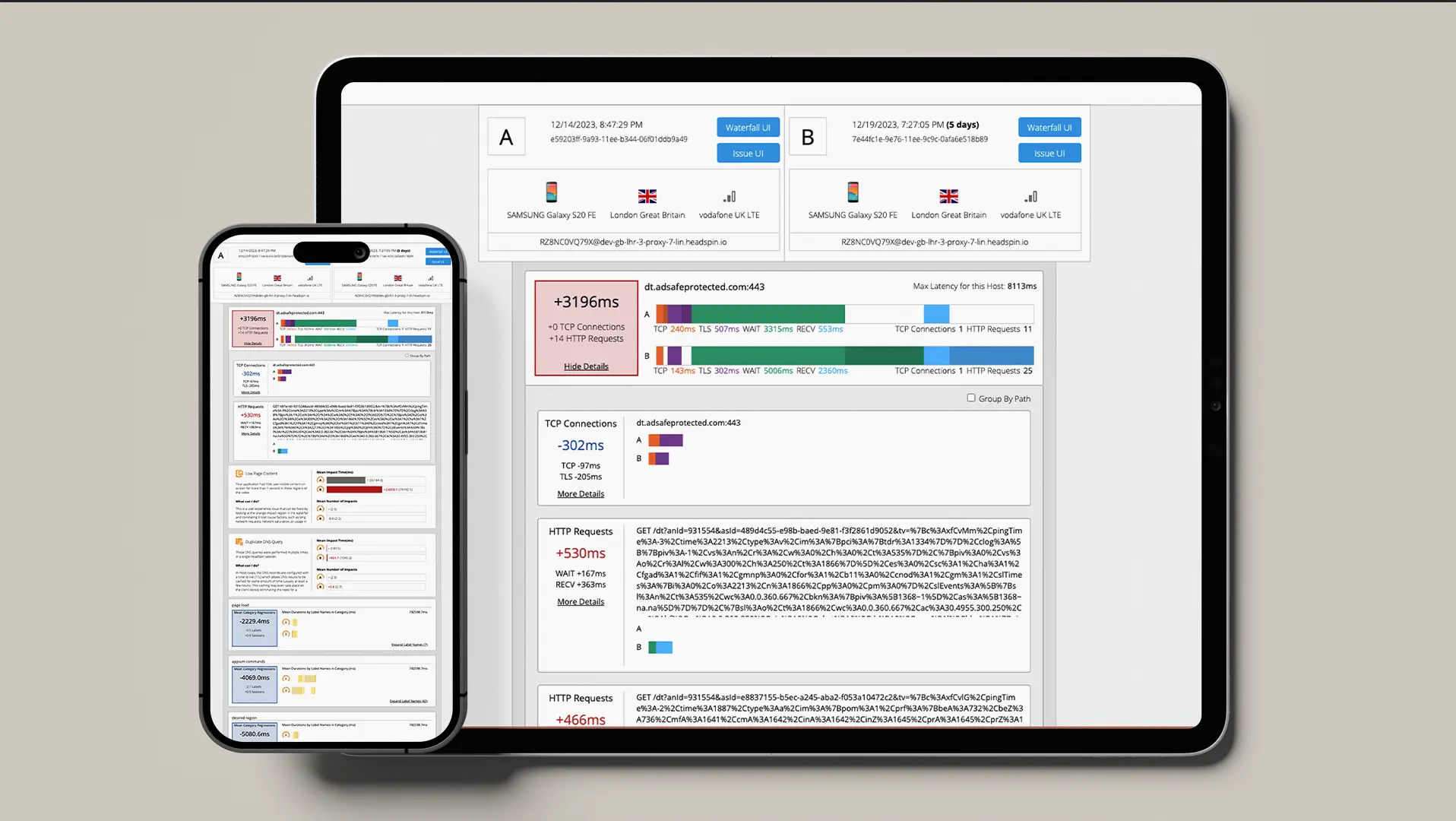AI-Powered Key Takeaways
With the advent of (AI), the landscape of software quality testing, especially regression testing, is undergoing a monumental transformation. This blog explores the seismic shift AI introduces to software quality testing, zeroes in on automating regression testing, delves into the emergence of AI-based testing tools, and sheds light on how HeadSpin is pioneering this revolution.
The Revolution in Regression Testing
In the digital age, where software evolution is as inevitable as the rising sun, regression testing is the guardian of software integrity. This crucial testing phase ensures that new code additions or modifications don't disrupt existing software applications and well-oiled machinery. However, the traditional approach to regression testing often resembles a Herculean task—it's time-consuming, resource-intensive, and prone to human error. Enter AI, the game-changer that's turning this daunting task into a streamlined, efficient, and far more effective process.
Transforming Testing with AI and ML
AI, mainly through machine learning (ML), transforms regression testing from a manual, error-prone, and tedious process into a dynamic, automated, and intelligent system. ML algorithms, trained on vast datasets of past test cases, application performance metrics, and user interactions, can predict outcomes, identify test scenarios, and even adapt testing strategies in real-time.
Imagine a scenario where your AI system identifies which tests to run and predicts the potential impact of new code changes on various parts of your software. This predictive capability ensures that testing is not just reactive but also proactive, significantly enhancing the effectiveness of the regression testing process.
Automation at Its Finest
The automation of regression testing, powered by AI, is a standout feature of this revolution. Now armed with AI, automated testing software goes beyond executing predefined test cases. It intelligently selects, modifies, and creates test cases based on ongoing learning. This means each test cycle is not just a repeat of the previous one but an evolved, smarter version, reducing redundancy and focusing on areas of highest impact.
Speed and Efficiency: The New Norms
By automating the identification of necessary test cases and executing them swiftly, AI reduces the testing cycle from days or weeks to hours or minutes. This rapid turnaround accelerates the development cycle and ensures bugs are identified and addressed quicker, enhancing the software's quality and reliability.
Enhanced Accuracy and Reduced Human Error
Human intervention, while invaluable, is prone to errors, especially in repetitive and meticulous tasks like regression testing. AI significantly reduces this margin for error. It consistently applies the same standards, learns from past mistakes, and improves over time, ensuring the regression testing process becomes increasingly accurate and reliable.
Cost Efficiency: A Happy Byproduct
While the upfront investment in AI for regression testing might be significant, the long-term cost benefits are undeniable. By automating the testing process, reducing the time and manpower needed, and enhancing the accuracy of tests, AI significantly cuts down the overall cost of quality assurance. Moreover, catching issues early and reducing the incidence of post-release failures saves organizations from potential losses due to downtime or reputational damage.
In essence, the revolution in regression testing, driven by AI, is not just transforming this testing phase; it's redefining software quality standards. It's a leap into a future where testing is faster, more accurate, and seamlessly integrated into the development cycle, ensuring that software meets and exceeds the ever-growing quality and reliability expectations.
The Role of AI-Based Testing Software
In the fast-paced world of software development, AI-based testing software is not just a tool; it's a game-changer. This advanced software harnesses the power of artificial intelligence to redefine the traditional approaches to software testing, particularly in the realms of efficiency, effectiveness, and predictive analysis.
1. Enhanced Efficiency through Automation
One of the standout features of AI-based testing software is automating repetitive and time-consuming tasks. Unlike traditional testing methods, which require manual input for every test case, AI-powered tools can automate test case generation, execution, and even the analysis of results. This automation goes beyond mere repetition; it's about smart automation where the software learns from each test cycle, continuously improving and adapting its testing strategies.
2. Predictive Analysis and Advanced Problem Detection
AI-based testing software doesn't just react to scenarios; it predicts them. Utilizing machine learning algorithms, these tools analyze historical data and identify patterns, enabling them to predict potential future issues and vulnerabilities. This predictive capability allows developers to address problems before they escalate.
3. Continuous Learning and Adaptation
The beauty of AI is its ability to learn and adapt over time. AI-based testing software gets smarter with each test it performs. It uses the data from past tests to refine its algorithms, ensuring that each subsequent test is more accurate and comprehensive than the last. This continuous learning process means that testing strategies remain relevant and effective.
4. Enhanced Test Coverage and Quality
AI-based testing software can execute vast tests simultaneously, providing broader coverage than manual testing. It can quickly identify areas that require more in-depth testing and allocate resources accordingly. This not only speeds up the testing process but also enhances the overall quality of the software, as it ensures that every potential issue is thoroughly examined.
5. Integration with Development Processes
AI-based testing software seamlessly integrates with existing development processes, providing real-time insights and feedback to developers. This integration ensures that testing is not a standalone phase but a continuous aspect of the development cycle, fostering a more collaborative and proactive approach to quality assurance.
6. Facilitating Shift-Left Testing
Shift-left testing is a practice where testing is performed earlier in the development cycle. AI-based testing software facilitates this approach by enabling developers to test new features or code changes as soon as they are implemented. This early detection of issues not only saves time but also significantly reduces development costs.
Enter HeadSpin: A Vanguard in Automating Regression Testing
HeadSpin stands out as a trailblazer in integrating AI with regression testing, offering features that set new benchmarks in efficiency and quality. Here's how HeadSpin is making a significant impact:
- Comprehensive Integration: HeadSpin seamlessly integrates with your existing development workflows, providing a streamlined process for automating regression testing. This integration ensures that your testing keeps pace with rapid development cycles.
- AI-Powered Analysis: Utilizing advanced AI algorithms, HeadSpin analyzes application performance across many devices and networks. This analysis is not just surface-level; it offers deep insights, identifying potential issues that could impact user experience.
- Actionable Insights: Beyond just identifying issues, HeadSpin offers actionable insights. This means that it not only points out what's wrong but also guides how to fix these issues, enhancing the efficiency of the debugging process.
- Automated Testing Workflows: HeadSpin significantly reduces manual effort by automating the regression testing process. This automation extends to test case generation, execution, and optimization, making the testing process faster and more effective.
- Cross-Platform Testing: In today's diverse tech landscape, applications must perform flawlessly across various platforms and devices. HeadSpin supports cross-platform testing, ensuring your application delivers a consistent user experience everywhere.
Final Thoughts
Integrating AI into software quality testing, especially regression testing, is not just a trend; it's a pivotal shift towards more efficient, accurate, and reliable software development. With tools like HeadSpin, organizations can harness AI's power to meet and exceed the evolving expectations in software quality assurance. As we embrace this AI-driven future, the potential to innovate and enhance software quality is boundless, setting a new standard in the tech industry.
Incorporating HeadSpin into your testing strategy elevates the quality of your software and aligns your testing practices with technological advancement, ensuring that your products meet the high standards of today's digital landscape.
FAQs
Q1. How does AI improve the accuracy of regression testing?
Ans: AI enhances accuracy by learning from historical data, identifying patterns, and predicting potential future issues, which allows for more precise test case generation and execution.
Q2. Can AI-based testing completely replace manual testing?
Ans: While AI significantly boosts testing efficiency and coverage, it complements rather than replaces manual testing. Human intuition and expertise remain crucial for certain complex testing scenarios.
Q3. What are the cost implications of integrating AI in regression testing?
Ans: Although the initial integration of AI into regression testing might require a significant investment, over time, it reduces costs by streamlining testing processes, eliminating the need for extensive manual testing, and reducing post-release failures.


























.png)

























-1280X720-Final-2.jpg)






